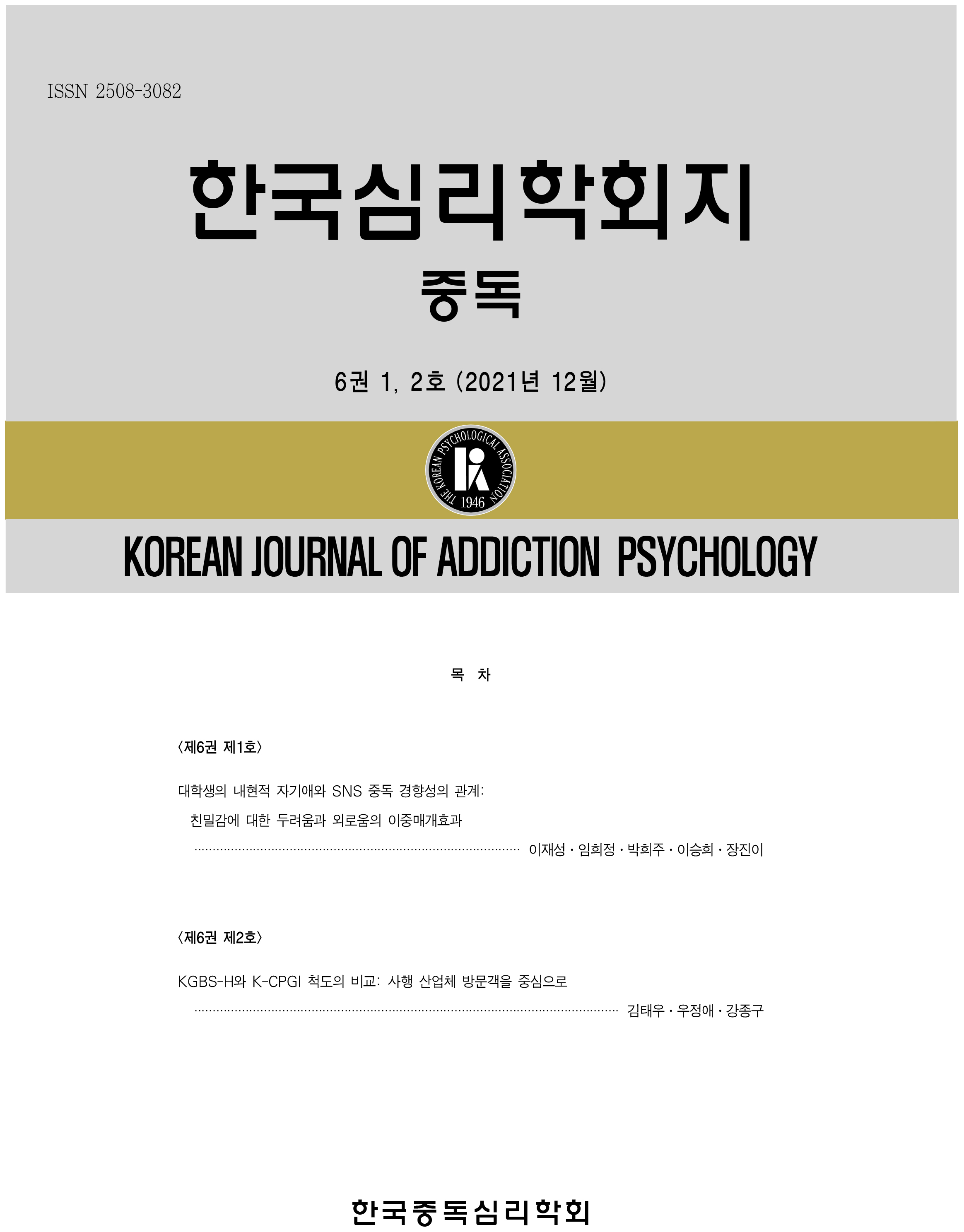대학생의 게임이용 형태와 자기통제력과의 관계
The Relationship between Game Use Types and Self-regulation in College Students

박주희(Joohee Park) (예원예술대학교 교양학부)
초록
본연구의 목적은 대학생의 게임이용 형태와 자기통제력과의 관계를 밝힘으로써 게임활동의 긍정적 효과를 끌어내고 게임선용을 유도하여 건전한 게임문화 형성을 지향하기 위한 것이 다. 이를 위해 대학생 및 대학원생 128명을 대상으로 ‘메타인지’, ‘자기통제력’, ‘게임선용’, ‘문제적 게임이용’, ‘게임시간’을 측정하기 위한 설문조사를 실시하였다. 모델에 도입할 변수 구성을 위한 요인분석을 통해, ‘메타인지’에서는 [조절_관리], [계획_점검] 두 개 요인을, ‘자 기통제력’에서는 [행동통제], [감정통제], [수행통제]의 세 개 요인을 ‘게임선용’에서는 [긍정효 과 확장], [사회망 확대], [통제력 강화]의 세 개의 요인을, 그리고 ‘문제적 게임이용’에서는 [통제불능], [부작용 초래]의 두 개 요인을 각각 추출하였다. 세 개의 연구가설을 검증하기 위 해 구조방정식모델분석을 실시한 결과, ‘메타인지’에서 ‘자기통제력’으로의 영향지수(p<.001) 와 ‘메타인지’에서 ‘자기통제력’을 경유한 ‘게임시간’으로의 간접효과에서 유의미한 결과가 나타났다(p<.05). 또한, ‘자기통제력’에서 ‘게임선용’으로는 긍정적 효과가, ‘문제적 이용’으로 는 부정적 효과가 나타났으며 ‘자기통제력’에서 ‘게임선용’과 ‘문제적 이용’을 경유해서 얻어 진 총 간접효과에서도 유의차가 나타났다(p<.05). 마지막으로 ‘게임선용’과 ‘문제적 이용’간의 상관계수에서도 유의차가 나타나, 본연구에서 설정한 3개의 연구가설은 모두 검증되었다. 이 와 같은 결과는 메타인지가 활성화된 자기통제력이 문제적 게임이용을 억제함과 동시에 게 임선용을 주도할 변인임을 시사한 것으로 해석할 수 있다.
- keywords
- 게임 선용, 문제적 게임이용, 자기통제력, 메타인지, 대학생
Abstract
The purpose of this study is to derive the positive effects of game activities by revealing the relationship between the form of game use and self-regulation of college students, and to promote the formation of a sound game culture by inducing good use of game. To this end, a survey was conducted on 128 college and graduate students to measure “metacognition”, “self-regulation”, “good use of games”, “problematic game use”, and “game time”. Factor analysis was conducted to construct variables to be introduced into the model. Through factor analysis, two factors of [regulation management] and [planning check] were identified in ‘metacognition’, and three factors of [action control], [emotion control], and [performance control] were identified in ‘self-regulation’. In ‘good use of games’, three factors of [expansion of positive effects], [expansion of social network], and [reinforcement of control], and in ‘use of problematic games’, two factors of [uncontrollability] and [inducing side effects] each was extracted respectively. As a result of structural equation model analysis to verify the three research hypotheses, the effect index from ‘metacognition’ to ‘self-regulation’ was significant (p<.001). Also, a significant result was found in the indirect effect from ‘metacognition’ to ‘game time’ via ‘self-regulation’ (p<.05). In addition, in ‘self-regulation’, a positive effect was shown for ‘good use of games’ and a negative effect for ‘problematic use’. There was also a significant difference in the total indirect effect of ‘self-regulation’ obtained through ‘good use of games’ and ‘problematic use’ (p<.05). Finally, there was a significant difference in the correlation between ‘good use of games’ and ‘problematic use’, and all three research hypotheses established in this study were verified. These results can be interpreted as suggesting that metacognition-activated self-regulation is a variable that will inhibit problematic game use and at the same time lead game selection.
- keywords
- good use of games, problematic game use, self-regulation, metacognition, college student
- 투고일Submission Date
- 2021-12-30
- 수정일Revised Date
- 게재확정일Accepted Date
- 2022-12-31
- 다운로드 수
- 조회수
- 0KCI 피인용수
- 0WOS 피인용수


